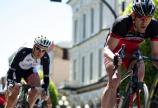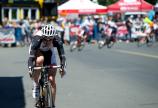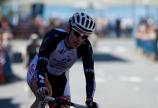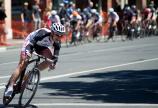French course takes Tour de France to new level
- Tara Sharpe
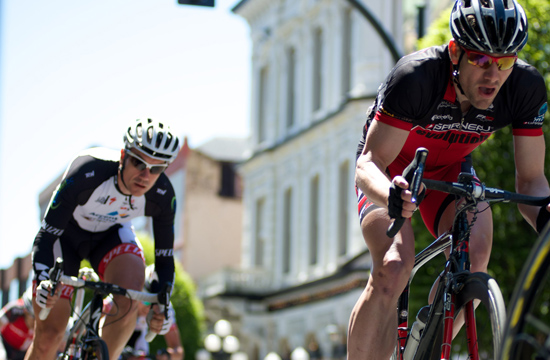
Enrolment for courses which immediately captivate the interest of students can be as smooth as coasting downhill in the Pyrenees. This is what assistant professor Dr. Emile Fromet de Rosnay was hoping, and has witnessed firsthand, for his new online course starting five days before the Tour de France, now in its 100th year.
Tour de France 2013 will begin June 29, moving through the south of France like a giant snake of wheels and brawn. The racers will cover the 3,360-km route, culminating July 21 at night along the Champs-Élys&e#180;es in Paris. There will likely be broken records, and here at UVic, the third-level course has already broken records in terms of enrolment for the French department.
FRAN 325 - Studies in the Cultures of the French-speaking World: The Tour de France is offered in English and completely online (June 24 to July 19), timed in sync with the riders in France. De Rosnay is not averse himself to donning wick-tight racing colours and taking corners fast on a bike.
He is an elite cyclist and has been obsessed with cycling "since I was a kid." He has raced not only here in BC (most recently for Victoria's Bastion Square Grand Prix, June 2) but also elsewhere in Canada (including, a few days after speaking with The Ring, on the grueling four-day, five-stage Banff National Park Bike Fest in Alberta) and in the US (this year at the Mount Hood Cycling Classic in Oregon).
He says the idea for this summer's course "was a 'Eureka!' moment" for him, since he does not conduct research on his favourite pastime. FRAN 325 is a general culture course, mostly offered in English to introduce UVic students to French and francophone culture. As of press time, there were 147 registered students in de Rosnay's cl#8299; there are students from outside the faculty, from the physics, physiology, education and political science programs.
The students will explore the history of the Tour; representations of the Tour including in literature, cinema and the media; cultural aspects including with respect to fan and cycling groups; globalization of the Tour as a mega sporting and cultural event; and ethical debates surrounding doping and commercialization in sport, as well as the lack of equal gender representation. The course will include short podcast lectures, independent research work and critical analysis.
The online assignments are divided into three main components: each week, every student will file two discussion forum entries and comment on two others (forums will include but not limited to cyclingnews.com and canadiancyclist.com) will send a minimum of two original tweets per week as well as two responses; and will take part in online surveys devised by de Rosnay.
He adds that it cannot be "a cold website" so, in addition to short podcasts from him, he will conduct live video chats broadcast live via YouTube with several experts including internationally renowned cycling photographer Graham Watson. There will also be interviews with professional Canadian cyclists participating in the Tour, and with cycling experts. Students will be developing and providing the questions for these interviews.
De Rosnay's research interests encompass the digital humanities, and he is also working on a translation of Paul Fournel's A to Z of road cycling, M&e#180;li-V&e#180;lo: ab&e#180;c&e#180;daire amoureux du v&e#180;lo, which he is tentatively calling Bits and Bikes: a fanatic's A to Z of cycling.
He teaches modernist poetics and fiction, French cinema, theory and 18th- and 19th-century literature, and has said before that he sees his task as a teacher "as one of creating a dialogue and emphasizing the personal nature of understanding.
"Students should feel that they can bring their own knowledge to the material. The Humanities have a direct role in this respect, because culture is wonderfully hybrid and always open to interpretation and debate."
The Tour de France course is what is known as a "flipped classroom": instead of lectures from the instructor, students prepare for discussions, bringing their own responses to the online classroom.
De Rosnay thinks this type of highly accessible course can enhance the student experience from a pedagogical perspective.
"In the end, it's all about collaborative learning, the best kind of learning."
Course website: tdf325.wordpress.com
Twitter hashtag: #tdf325
De Rosnay's Twitter handle: @emilederosnay
Tour de France: letour.fr

